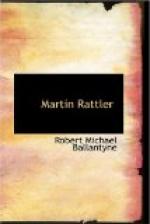The country over which they had passed during the day was of a mingled character. At one time they traversed a portion of dark forest, heavy and choked up with the dense and gigantic foliage peculiar to those countries that lie near to the equator; then they emerged from this upon what to their eyes seemed most beautiful scenery,—mingled plain and woodland,—where the excessive brilliancy and beauty of the tropical vegetation was brought to perfection by exposure to the light of the blue sky and the warm rays of the sun. In such lovely spots they travelled more slowly and rested more frequently, enjoying to the full the sight of the gaily-coloured birds and insects that fluttered busily around them, and the delicious perfume of the flowers that decked the ground and clambered up the trees. At other times they came to plains, or campos, as they are termed, where there were no trees at all, and few shrubs, and where the grass was burned brown and dry by the sun. Over such they hurried as quickly as they could; and fortunately, where they chanced to travel, such places were neither numerous nor extensive, although in some districts of Brazil there are campos hundreds of miles in extent.
A small stream meandered through the forest, and enabled them to refresh themselves frequently; which was very fortunate, for the heat, especially towards noon, became extremely intense, and they could not have existed without water. So great, indeed, was the heat about mid-day, that, by mutual consent, they resolved to seek the cool shade of a spreading tree, and try to sleep if possible. At this time they learned, to their surprise, that all animated nature did likewise, and sought repose at noon. God had implanted in the breast of every bird and insect in that mighty forest an instinct which taught it to rest and find refreshment during the excessive heat of mid-day; so that, during the space of two or three hours, not a thing with life was seen, and not a sound was heard. Even the troublesome mosquitoes, so active at all other times, day and night, were silent now. The change was very great and striking, and difficult for those who have not observed it to comprehend. All the forenoon, screams, and cries, and croaks, and grunts, and whistles, ring out through the woods incessantly; while, if you listen attentively, you hear the low, deep, and never-ending buzz and hum of millions upon millions of insects, that dance in the air and creep on every leaf and blade upon the ground. About noon all this is hushed. The hot rays of the sun beat perpendicularly down upon what seems a vast untenanted solitude, and not a single chirp breaks the death-like stillness of the great forest, with the solitary exception of the metallic note of the uruponga, or bell-bird, which seems to mount guard when all the rest of the world has gone to sleep. As the afternoon approaches they all wake up, refreshed by their siesta, active and lively as fairies, and ready for another spell of work and another deep-toned noisy chorus.




